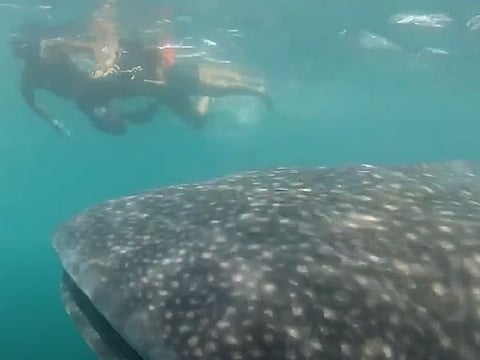Philippines: Whale shark interactions, more than 100 sites reopen to tourists
Dozens of destinations in Bicol region welcome visitors again after 2-year shutdown

Sorsogon, Philippines: If you want to interact with humongous whale sharks, the season is open once more in Donsol town of the touristy Sorsogon province.
After a two-year slump due to COVID curbs, visitors are now welcome as travel restrictions had been lifted in Donsol and more than 100 other tourist sites across the Bicol region, according to local officials. Swimming with whale sharks, the so-called "gentle giants" of the open sea, forms part of the bucket list of most visitors to the province, about 600 km south-east of Manila.
Prior PCR test for inbound fully-vaccinated domestic visitors had been scrapped in the province, alongside dozens of destinations in the country, including the world-renowned Boracay island.
In-bound international travellers are still required to obtain a pre-departure negative PCT test result within 48 hours before departure. However, for fully-vaccinated international visitors and overseas Filipino workers (OFWs), mandatory facilities-based quarantine rule has been scrapped.
Tourism revival
The move is seen as key to the revival of the region’s tourism industry, a major job and revenue generator. Bicol, a region comprising six provinces east of Manila, boasts more than 104 tourism sites that had been flung open to visitors following two years of pandemic restrictions.
Together, the industry lost an estimated Php10 billion in the last two years due to the coronavirus pandemic.
But with high rates of vaccination and the drop in new cases and virulence, the sectors is slowly coming back to life. Not all COVID safety protocols had been scrapped yet.
Recently, health authorities downgraded the local COVID-19 alert status to Level 2 — which means indoor establishments are allowed to have a 50-percent capacity while outdoor areas may have a 70-percent capacity.
Attractions
Besides whaleshark interactions, Sorsogon is also known for its volcanic hot springs (in Irosin town), a pink-sand beach (in Matnog town), wave surfing (in Gubat), the Bulusan Lake and various eco-tourism sites.
Bobby Gigantone, chief of the Sorsogon Provincial Tourism Office (SPTO), announced the reopening decision following a meeting between local health, tourism and government agencies.
Certain guidelines had been adopted in order to ensure the safety of both the tourists and locals.
GETTING THERE
Donsol, a town in southeast Luzon, is a World Wildlife Fund-supervised destination for interacting with whalesharks, or "butanding". Donsol River, which feeds into Donsol Bay teems with plankton and krill. The whalesharks (locally known as butanding) return to Donsol each year from November to May to feed and breed. Donsol, in the Philippine province of Sorsogon, is about 60 minutes by car from the Bicol International Airport, in Albay, also home to the majestic Mayon Volcano.
Recovery
Tourism officials here are optimistic about the industry’s revival, following two years of hardship.
Data from Donsol Tourism Office (DTO) showed the pre-pandemic edition of the Butanding Festival in 2019 generated a total of Php448 million in gross revenues (about $9 million).
The DTO data also showed 13,000 tourist arrivals in the same year.
“With the permanent and temporary closure of tourist establishments such as hotels, resorts, restaurants, hundreds of millions in revenue were lost and hundreds of workers lost their jobs,” Gigantone said.
Collaboration with WWF
The town's whale shark interaction project is a collaborative undertaking between the local government, the Department of Tourism (DOT), and the World Wide Fund for Nature (WWF) Philippines, a joint commitment for a sustainable and balanced eco-tourism program.
Sorsogon Gov. Francis Escudero, in a statement, said the reopening of the sites would help the industry and community recover from a tough period.
The province will soon also open other tourist destinations, including the Bulusan Natural Park, Escudero said.
Department of Tourism director Herbie Aguas told the Philippine News Agency that the Bicol Region’s tourism industry lost an estimated Php10 billion (about $200 million) in the the last two years.
He also said the pandemic taught some industry stakeholders to find alternative sources of income, such as engaging in agri-tourism.
Agri-tourism sites
Bicol currently has 16 farm sites that feature agricultural products, research and development, farm exhibits, and farmers' training.
Among the sites opened for tourist:
Sign up for the Daily Briefing
Get the latest news and updates straight to your inbox



